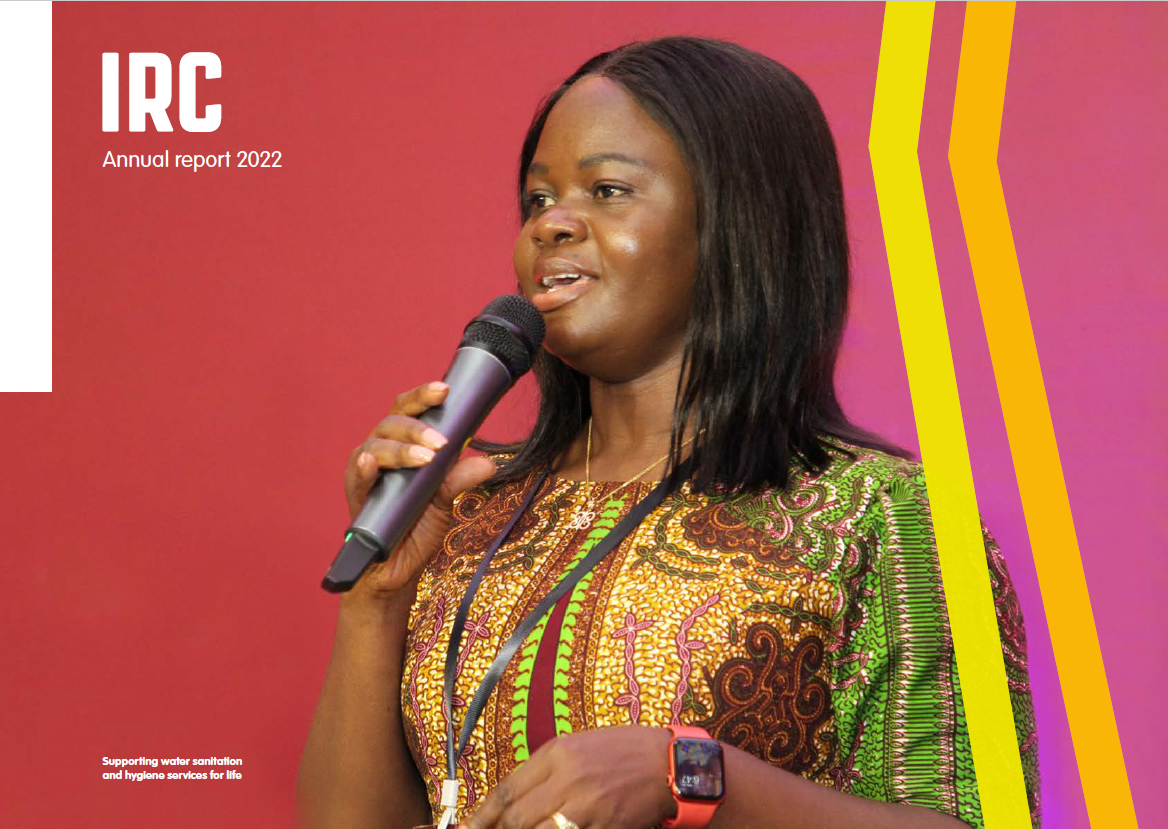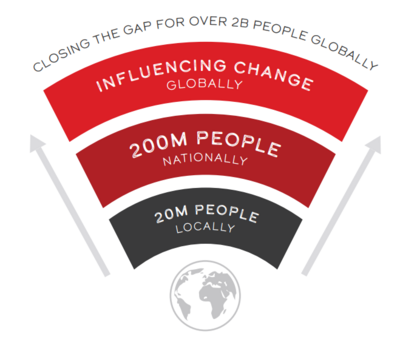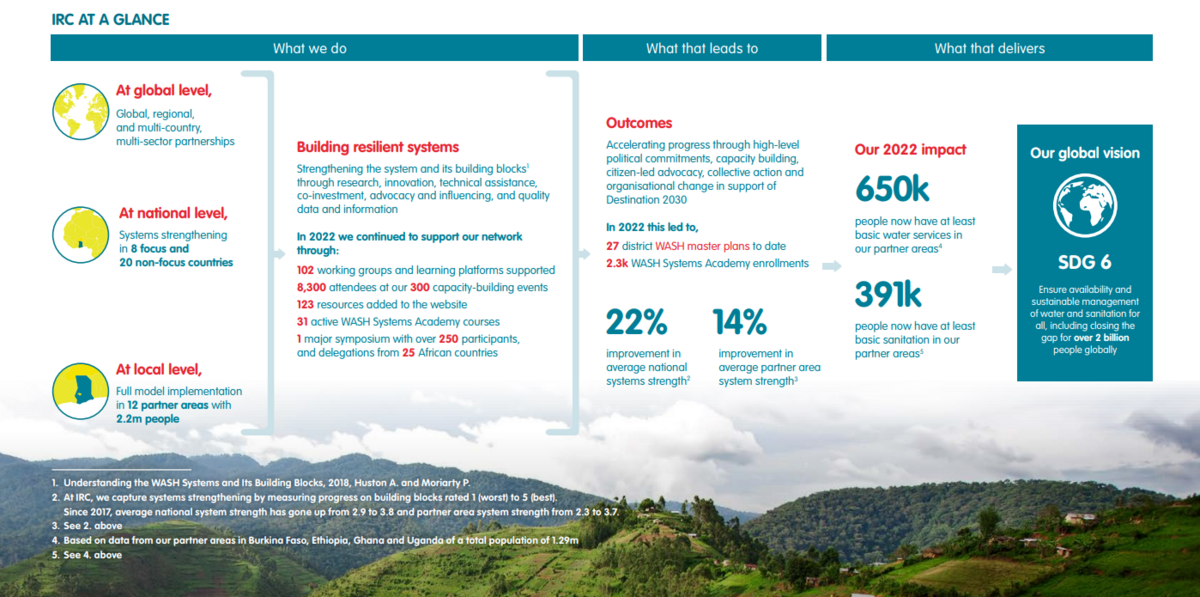Achieving systems strengthening at scale by inspiring political commitment
Published on: 29/06/2023

Delivering on the vision of the Sustainable Development Goals demands profound change. We know that although it's of crucial importance, strengthening national systems is not enough to achieve our ambitious goals. That's why 2022 was defined by a deeper collaboration and continued commitment to the power of collective action. 2022 was the first year we—IRC, Water For People and Water for Good—worked together, as Alliance members, to implement our new Destination 2030 shared strategy and joint mission. We are aiming to close the gap for over 2 billion people globally, 200 million people nationally, and 20 million people locally, whose health, lives and futures are at risk from dirty water and poor sanitation and hygiene.

Since 2017, IRC has been working with partner districts to develop more than 27 master plans. The development of such a plan is a political and technical process that convenes diverse stakeholders under government leadership. It starts with defining a WASH baseline of the administrative area including a context analysis. This is then followed by the development of a common vision, joint action agenda, and common monitoring and resource mobilisation strategies. In 2022, we launched our District WASH Master Planning Facility to take the planning approach to scale.
This type of visionary planning works – and has been effective despite setbacks with political instability in Burkina Faso and Ethiopia, and the after-effects of COVID-19 on public health and economies. Local leaders are starting to champion the stories resulting from these master plans, and in doing so, are inspiring change at regional and national levels.
For example, in Burkina Faso, the 2018-2030 district WASH master plan of Banfora has united regional authorities and others and resulted in three regional master plans covering 87 districts – almost 25% of all districts across the country (see page 15 of the Annual Report). In Ghana, Asutifi North's Ahonidie Mpontuo initiative is now being replicated in three other districts in the Ahafo region.
We raised the profile of this work and shared our learning during All Systems Go Africa, our very first systems symposium in Africa. The event helped drive greater political commitment across the continent to achieving SDG6, and stronger investments in governance, management and operating systems.
All Systems Go Africa was our first major international event in three years and a major milestone in building our community of systems leaders. The symposium convened 250 political leaders, government officials, academics and other professionals from 25 countries. An important emerging theme from the symposium and our broader work was the need to move from strengthening existing systems to advocating and supporting profound systems change through systems leadership. This has to happen at all levels of water, sanitation and hygiene systems, and across interconnecting systems such as health, climate, economic development and social justice.
Six urgent actions were identified at the event with the leadership of the African Ministers' Council on Water (AMCOW), and these will inform the design of the post-2025 Africa Water Vision. AMCOW also made a commitment to support systems change and strengthening in Africa.
Beyond the African continent, attending Singapore International Water Week and the Sanitation and Water for All Sector Ministers' Meeting in Jakarta, Indonesia, provided opportunities to reach out to current (India, Bangladesh) and potential new Asian counterparts, and key players such as the Asian Development Bank.
We've been increasingly reaching out beyond water, sanitation and hygiene to make connections with colleagues in health, climate, education, economic development and social justice. We know we need to connect across silos and sectors if we're to tackle the challenges we're all facing and achieve the SDGs. And we believe the solutions lie in strong, interconnected, national and local systems working in co-ordination to deliver crucial public services. This requires systems leadership – leading across boundaries and driving collective action in complex circumstances; connecting across silos and sectors - finding better ways to address shared system challenges, together; and importantly, taking action– making commitments that will accelerate progress and deepen impact to achieve the Sustainable Development Goals. So the aim of our CONNECT approach is to build alliances, champion systems leadership and mobilise broader coalitions nationally, regionally and globally promoting our shared interest in resilient human development. This has provided the inspiration for the All Systems Connect International Symposium 2023.
Ahead of this, in January 2022, IRC hosted a unique platform for young climate and water activists. The Post-COP Activists Connect online event demanded more integrated thinking and collaboration to achieve a more intersectional, inclusive and equitable future. Six young leaders shared honest reflections on the global COP conference: shining a light on the glimmers of hope, but more importantly illuminating points of improvement. The event demarcated the launch of the Toilet Talks show and website, driven by IRC's larger ambitions to move beyond siloed thinking and fuel connection.
We are aiming to grow, to achieve and to sustain greater and systemic impact across the world. This ambition requires us to better anchor ourselves in the respective societal and institutional systems we need to transform to deliver effective public services that last. To support that, we are changing from one organisation headquartered in The Netherlands into an international federation of country, regional and global members. In 2022, we were excited to open our newest office in Mali, and to finalise the requirements for doing so in Niger. Both of these branch offices will, eventually, become independent entities along with all of IRC's other national offices – part of a network of independent and interdependent organisations delivering IRC's mission.
The mission of One IRC is to significantly improve the quality of life for more people over the next decade by strengthening water, sanitation and hygiene systems at local, national and international levels.
Read our Annual Report 2022, our Monitoring Report 2022 and our 2022 Financial Report for more highlights and details of our work.
